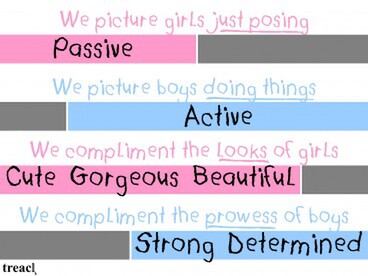I recently analysed the photos of the 254 of my Facebook friends who have children.
Does early-years stereotyping of our children influence their own career aspirations and image of themselves?
We picture sons actively doing things.
We picture daughters passively posing.
82% of photos of sons, and just 46% of daughters feature them busy on some activity like playing, or interacting with others.
54% of photos of daughters, and just 18% of sons and feature them just passively posing for the camera.
We compliment sons’ prowess.
We compliment daughters’ looks.
65% of photos of sons, and just 18% of daughters attract compliments about an attribute other than their appearance. The most popular ones were “strong” and “determined”.
82% of photos of daughters, and just 35% of sons attract compliments about their appearance. The most popular ones were “cute”, “gorgeous”, “pretty”, and “beautiful”.
Does early-years stereotyping of our children influence their own career aspirations and image of themselves?
We picture sons actively doing things.
We picture daughters passively posing.
82% of photos of sons, and just 46% of daughters feature them busy on some activity like playing, or interacting with others.
54% of photos of daughters, and just 18% of sons and feature them just passively posing for the camera.
We compliment sons’ prowess.
We compliment daughters’ looks.
65% of photos of sons, and just 18% of daughters attract compliments about an attribute other than their appearance. The most popular ones were “strong” and “determined”.
82% of photos of daughters, and just 35% of sons attract compliments about their appearance. The most popular ones were “cute”, “gorgeous”, “pretty”, and “beautiful”.
Does early-years stereotyping of our children influence their own career aspirations?
I recently gave a talk at the Fraud Women’s Network annual event. (I wholeheartedly recommend this to any women working in the profession who want to connect with others, or who could benefit from mentoring.)
As in many other professions, women are under-represented in number and in seniority.
Prowess and activity are far more valuable in most worthy jobs than looks.
Are we holding girls back by making them feel appreciated mainly when they look beautiful? And could this be why more girls than boys feel self-conscious about their looks?
Are we encouraging boys to perform well in the workplace by recognising their activity? And do we inadvertently make girls feel that their activity is less valuable?
Write a comment if you have a view.
Get in touch if you have performance and equality issues in your workforce. And share this if you know anyone who posts photos of their children on Facebook!
As in many other professions, women are under-represented in number and in seniority.
Prowess and activity are far more valuable in most worthy jobs than looks.
Are we holding girls back by making them feel appreciated mainly when they look beautiful? And could this be why more girls than boys feel self-conscious about their looks?
Are we encouraging boys to perform well in the workplace by recognising their activity? And do we inadvertently make girls feel that their activity is less valuable?
Write a comment if you have a view.
Get in touch if you have performance and equality issues in your workforce. And share this if you know anyone who posts photos of their children on Facebook!
